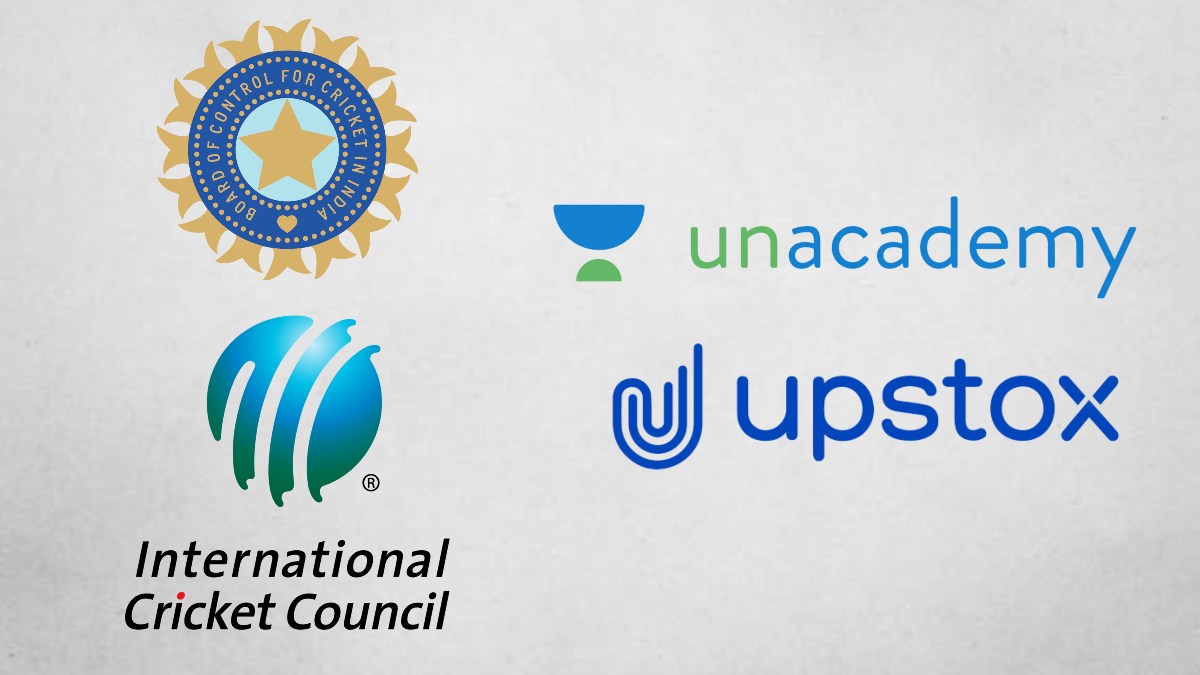The two of the most lucrative entities in world cricket, the Board of Control for Cricket in India (BCCI) and the International Cricket Council (ICC) are reportedly struggling with their existing sponsors.
The official sponsors of the Indian Premier League (IPL), Upstox and Unacademy have informed BCCI of an immediate transfer of rights as the two brands wish to discontinue the association.
The partnership of Upstox and Unacademy runs till April 2023 with the BCCI.
BCCI provides a sponsorship clause, which allows the brand that has an existing partnership with the cricket governing body of India to sell its sponsorship rights to some other company, that is willing to team up with the board.
According to the clause, Upstox and Unacademy, who wish to transfer their rights, will also have to pay a ‘transfer of right’ fee to the BCCI of five per cent for not honouring the duration of the association.
The representative agencies of both brands have been looking for other companies in the market who are willing to buy their sponsorship rights with the BCCI for one year.
Paytm, the title sponsorship rights holder of India’s home fixtures, also reportedly requested BCCI to transfer its rights to Mastercard.
Upstox, which is also the official sponsor of the ICC, has also approached the international cricket governing body for transferring the sponsorship rights, according to reports. The amount is around INR 40 crore in this collaboration and the company has decided to cut down the overwhelming sponsorship costs.
Along with Upstox, OPPO, which has been the sponsor of the ICC since 2016, has also contacted the international cricket board to exit the deal or sell the rights to another sponsor. The Chinese brand has also earlier sold its BCCI sponsorship rights to BYJU’S.
The VC funding of several start-up companies has dried up, who invest in growth by signing such lucrative and high-impact sponsorship deals. Due to this, the investors have been asking the start-ups to focus more on gaining profit rather than spending a massive amount on such sponsorships.
The edutech startups are the first in line to face the heat as reports have emerged that BYJU’s has laid off over 500 employees across WhiteHat Jr. and Toppr.
The transfer of rights started when Vivo reassigned the IPL title sponsorship to Tata earlier this year, which was followed by Paytm along with Unacademy and Upstox, recently.
Such frequent midway transfers in sponsorship rights will make BCCI think about their upcoming cycle. The Indian cricket board might think of signing the traditional companies who are more likely to stick and complete the duration of the partnership, unlike the startups who aren’t in a position to complete the tenure and exit midway. Startups are willing to pay more due to the aggressive competition as they offer various categories, which also helps BCCI increase its valuation. The traditional companies are focused on profit and loss along with quarterly and yearly results. BCCI will have to bifurcate and provide proper weightage to both startups and traditional companies so that the brands complete their tenure with the board.
Apart from all the above factors, the practice of bank guarantee could also be one of the major drawbacks for brands signing a sponsorship deal with the BCCI or ICC. When a brand teams up with any of these two entities, along with the sponsorship amount, the company also has to give a bank guarantee. The bank guarantee amount is the same as the sponsorship amount that was paid initially. If a brand pays INR 60 crore in a sponsorship deal, then the company also has to give an additional INR 60 crore as a bank guarantee. The bank guarantee stays with the BCCI or ICC till the duration of the sponsorship is complete. Due to this procedure, apart from the sponsorship amount, the working capital is also blocked, which creates distress for the brands at times.
On the other hand, if we compare it with media deals in the same events with TV & digital broadcaster, sponsors are obliged to pay just before their campaign starts in the event for the amount of inventory being considered. Later, if the entire inventory isn’t consumed, sponsors get a refund from the channels. This works well for the brands as this doesn’t hurt their working capital.
The two of the biggest entities in the sports industry should look into this procedure and make some necessary amendments if they wish to make their respective organisations more business-friendly.

